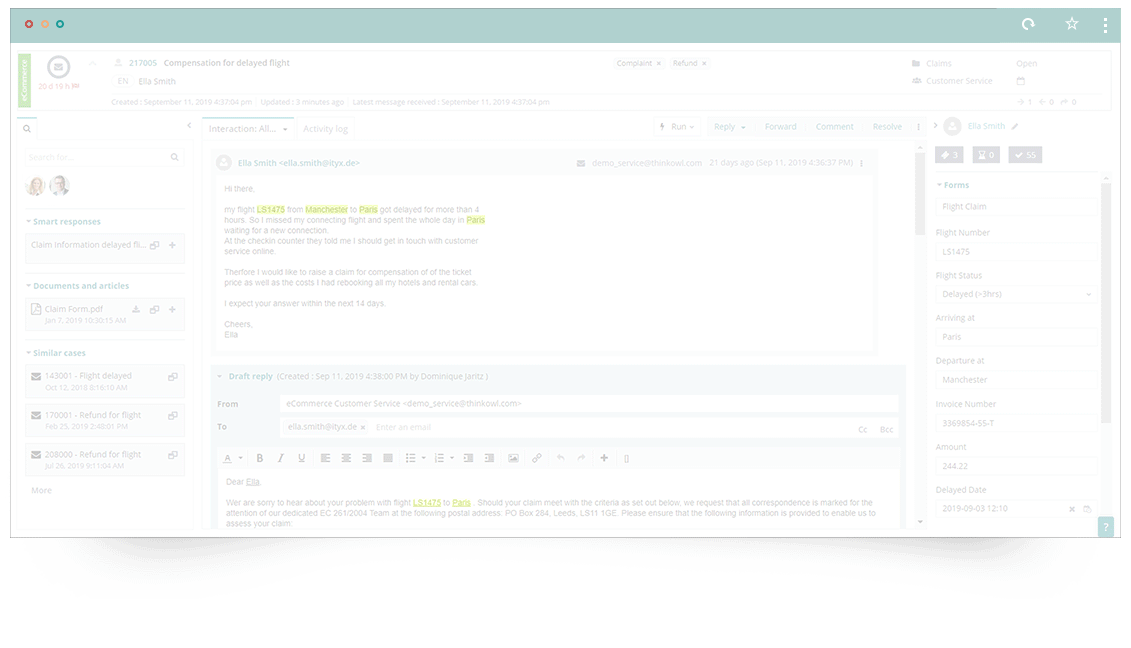Technology is changing. Lately, resolving customer issues at the earliest is as critical as delivering a new product to customers.
When you have to resolve an issue, you tend to focus on the content and type of requests. Isn't that so? Agents generally spend 20 to 30% of their time trying to get an overview or hunting for the right information.
That's how the influence of helpdesk automation on support management only continues to grow with each passing day. With so much hype around AI-based helpdesk, support businesses need to separate the signal from the noise.
How do they do this? Put intelligent helpdesk to use in the right way.
Intelligent helpdesks answer these ten most pressing questions about customer cases with one click:
1. Case overview: What's it about?
An intelligent helpdesk offers a compact case overview. At a glance, the case overview shows all relevant metadata, from intent to case status, right at the top of the screen. When was the email received? How much processing time remains? Is a team member already working on the case?
2. The experts: Who has the best of knowledge?
One AI feature of the intelligent helpdesk is to display your company’s "experts." The intelligent system lists employees who have aced similar cases in the past and already have experience with the topic at hand. So, the AI allots the case to the experts automatically.
3. Have there been similar cases?
In addition to the expert, the intelligent helpdesk also lists tickets stored in the system. It automatically identifies these cases and draws on them for the new case. Extremely helpful: Without much effort, agents can compare how their colleagues have successfully resolved similar cases in the past.
4. Intelligent responses: What are the options for answering the request?
AI progressively handles how to respond to customer requests. On the basis of the training data supplied to the system, it provides the best text suggestions for the case at hand. The software automatically populates variable text fields, such as customer name, email address and other specific information.
All that your agents have to do is select the right response to be sent to the customer, just in time.
5. Do you have relevant background information?
An intelligent helpdesk helps you add context-relevant content to the case — for example, brochures, e-books, how-to videos, guides, or content of that nature — that could be relevant to the current case or informative to your customer. With one click and without elaborate research, agents can include this content in the email.
6. The search box: Where can you find additional information?
In case you are still missing a document or important information needed to process the case after using the tools listed above, advanced customer service solutions offer an intelligent search box that opens with every new case. Use this field to search for experts, text templates, documents, articles or similar requests, without having to switch systems.
7. Customer details: What do you know about the customer?
What’s more, the intelligent helpdesk provides a complete customer overview across all channels. At a glance, you can see past cases involving this customer, and whether there are any other open cases with the same person. This information is also helpful in gauging the current situation and your customer’s mood.
8. Customer fields: Which case-specific information is important?
In addition to the customer details, helpdesks bring data specific to the case and your business directly into view on the screen. For example, to process billing cases, agents usually need the customer’s account number. You can predefine and link information, such as the account number, using custom data fields. The case-relevant metadata automatically displays on the screen upon opening the case.
9. What tasks do you need to perform?
Similarly, you can create user-specific custom data fields to define and automatically display specific tasks that agents need to perform as part of processing a case. Thus, always keep reminding them about outstanding tasks.
10. Automatic time tracking: How much time do you have left?
Time tracking tools are another useful feature in customer service. As soon as you open a case, you get to see how much time you’ve already spent on a customer case and how much time is remaining. This is important for you to hit company targets. You can also choose to hide it whenever needed.
In short: If you work with an intelligent helpdesk, as soon as you open the ticket you automatically get to see the entire customer case. This means, no tedious searching or interruptions — your agents’ work not only becomes more efficient but also more fulfilling. Aren't these all good reasons to seriously consider implementing AI-powered helpdesk? Of course, they are. It's the right time for you to bring AI to your customer service to make it "to the point". And for this you need a modern customer service tool like ThinkOwl, that too has answers to all these questions. Give it a try now and take your customer experience to the next level.

